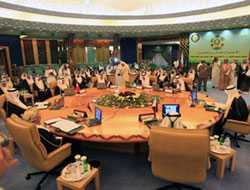Dr Siret Hursoy and
Dr N. Janardhan (GULF)
14 October 2011
As the domestic political dynamics of a good part of the Middle East change, so is its international relations (IR) landscape.
This is best exemplified by Turkey’s public relations (PR) machinery positioning it as the new face of the region.
After first being denied immediate membership in the European Union about a decade ago and then being reluctantly offered a chance to negotiate its accession in 2005, which is proceeding at snail’s pace, Turkey began to recalibrate its foreign policy to become an influential player in the Middle East.
The fact that Turkey also evolved a successful combination of Islam, democracy, capitalism and soft power broadened its global appeal and led to the expansion of ties across the region. Turkish Premier Recep Erdogan’s recent ‘Arab Spring tour’ came against a backdrop of escalating tension with former friend Israel, which has won some support for Ankara in the Middle East. Ankara’s stand on Tel Aviv, in particular, is being touted as the way a rising power should position itself in realpolitik – for example, agree with the United States on Syria and Libya, but differ on Israel.
A poll released in March 2011 by TESEV, a Turkish research centre, revealed that 66 per cent of respondents in six Middle East countries — including the Gulf — thought that Turkey could be a regional model. How does this new posturing impact Turkey-Gulf relations?
After a long-established Western-oriented foreign and security policy tradition that could be traced to the establishment of the Turkish Republic in 1923, the foundation for improved relations with the Gulf was laid following Ankara’s refusal to allow Washington to use its territory to invade Iraq in 2003. Turkey’s recent stance on Libya, Israel and Syria has been in sync with the Gulf countries too.
Even on Iran, the fact that Ankara has endorsed a plan to host an American X-band radar system that is part of a NATO missile defence system, which Washington claims to protect against possible Iranian ballistic missile threat, is evidence of Turkey being a potential protector of Gulf interests, while remaining a potential mediator. In fact, the United States encouraged Turkish diplomatic involvement to calm the region as the rhetoric between the Gulf countries and Iran heightened over Bahrain in April.
Apart from its unique position of being able to talk to all parties, other dynamics of Turkey’s politics, economy, society and international relations could also be appealing to a transforming Gulf.
Erdogan’s Justice and Development Party is both conservative and reformist. This has enabled it to position itself well between the East and the West, better than any previous Turkish governments, thereby reducing the impediments that underscored Turkey’s ‘soft-power’ potential in the past. As part of Turkey’s pivotal role in inter-civilisational dialogue, it stressed on a ‘zero-problem’ policy with its neighbours, which extended its ‘soft-power’ status within the regional systems, thereby contributing to stability in the Middle East, Caucasus, the Balkans and Central Asia. By excelling in the dual process of political democratisation and economic liberalisation, it has offered a workable model that could serve the region well in the ‘post-Arab awakening’ era. Turkey’s ‘rhythmic’ diplomacy of the last decade combines political dialogue and negotiation at the state level with activities of the civil societies and business organisations at the sub-state and trans-state levels.
Turkey’s increasing defence expenditure and active participation in humanitarian, peacekeeping and peace-making operations are a manifestation of its transformation from a ‘security consumer’ in the 1990s to a ‘security provider’, which should be attractive to the external security-reliant Gulf.
Equally, Turkey’s growing prestige in the Islamic world is evident in Foreign Minister Prof. Ekmeleddin Ihsanoglu becoming the first-ever elected Secretary-General of the 57-member Organization of the Islamic Conference, a post that he was re-elected to last year.
The pillars on which political ties could be strengthened hinge on economic cooperation. A 2008 memorandum of understanding made Turkey the first country outside the Gulf region to be conferred the status of “Gulf Cooperation Council (GCC) strategic partner”.
Aiding Turkey’s ‘hyperactive’ diplomacy is its thriving economy, which grew almost nine per cent in 2010. This and the Gulf’s investible capital have set the stage for a win-win situation, which is being guided by an action plan that includes projects pertaining to trade, agriculture, transportation, environment, tourism and culture, as well as a free trade agreement.
Further, in order to tap Turkey’s attractiveness as an energy export hub, plans are also afoot to bring to fruition a railway line connecting the Gulf countries to Europe via Turkey. All these mean that trade between Turkey and the six GCC countries, which was $17 billion in 2009, is poised to dramatically increase in the future.
Lending credence to this possibility, for example, investments between Turkey and the UAE reached $10 billion in 2010 and National Commercial Bank – the largest Saudi lender – suggested that the kingdom is likely to invest $600 billion in Turkey by 2030.
Together with this promise, however, there is scope for divergence. A taste of this is already evident with many in the Gulf worried about the pace of Turkish influence in the region, branding it as “neo-Ottoman” foreign policy.
In this milieu, how influential a power Turkey ends up being and how it would affect the political and economic ties with the Gulf countries will be determined by the will of both sides to evolve a win-win response to the ground realities of the region.
Dr Siret Hursoy is associate professor at Ege University, Izmir, Turkey; Dr N. Janardhan is a UAE-based political analyst on Gulf-Asia affairs and author of ‘Boom amid Gloom – The Spirit of Possibility in the 21st Century Gulf’



